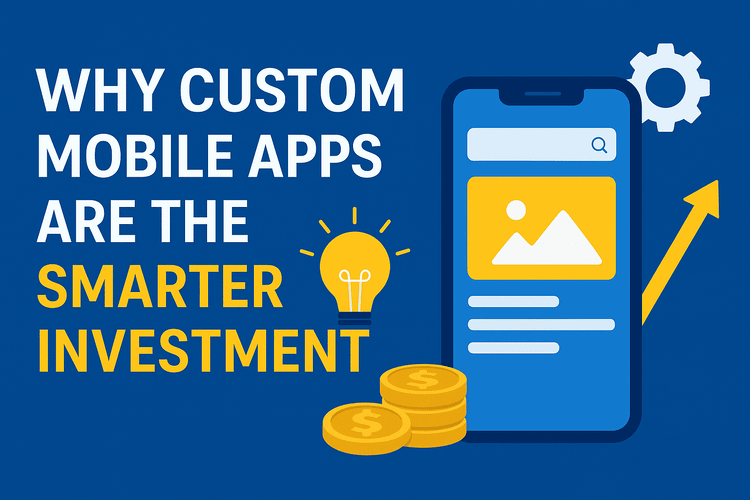As a startup, creating a digital product that truly reflects your mission and helps you gain traction is crucial. However, being a startup often means operating on a tight budget and timeline. With limited resources, it might seem tempting to use no-code or low-code platforms to quickly build your app. But, can these off-the-shelf solutions truly stand out in a market with nearly 5 million apps? Can they fully capture your company’s unique value proposition? In this post, we’ll explore why a custom mobile app development solution might be the better choice for your business.
Custom Apps vs. Ready-Made Solutions
Custom mobile app development involves creating an app from the ground up, tailored to meet your specific business needs. On the other hand, ready-made solutions, or white-labeled apps, are pre-built platforms that you can adjust or modify to fit your brand.
While ready-made solutions can be cost-effective and offer faster time-to-market, they often come with limitations in terms of functionality and design. Pre-built apps may fail to deliver the unique experience your business needs to differentiate itself in a crowded market.
However, there are situations where off-the-shelf solutions might make sense:
- Cost-Effective: Ready-made apps are generally cheaper and quicker to implement.
- Prototypes: If you’re in the early stages of product development, ready-made solutions can serve as a starting point to gather feedback or secure funding.
So why spend more on a custom mobile app development solution when you can opt for a cheaper alternative? The answer lies in the long-term advantages custom apps bring.
Advantages of Custom Mobile App Development
While custom mobile app development is an investment, the benefits can far outweigh the initial costs. A well-developed, customized app can help boost user engagement, enhance brand identity, and streamline business operations. Let’s take a closer look at these benefits:
1. Tailored to Your Business Needs
A custom mobile app can be designed to meet your business goals and user expectations precisely. Unlike off-the-shelf solutions, which offer a generic set of features, a custom app gives you full control over functionality, design, and the technology stack.
When you go the custom route, you can:
- Create a unique user experience (UX): Ready-made apps typically provide basic, one-size-fits-all templates. With a custom app, you can deliver a seamless, intuitive user interface (UI) that enhances user engagement.
- Showcase your brand identity: A custom-built app offers an opportunity to express your brand through design, helping you stand out from competitors and establish a strong market presence.
- Implement creative freedom: Whether you’re using a specific technology stack or integrating unique features, a custom app development solution allows you to build exactly what you need—without limitations.
2. Scalability
A custom app is built with growth in mind. As your business scales, you can easily add new features, expand functionalities, and adjust the app’s architecture to meet evolving needs.
In contrast, off-the-shelf solutions may struggle with scalability. As your user base grows, you could face performance bottlenecks or higher subscription fees, which can make scaling more expensive and challenging.
3. Ownership and Control
When you build a custom app, you own the intellectual property (IP) and have full control over the app’s development and maintenance. Ready-made apps, on the other hand, often come with limitations regarding branding, usage rights, and distribution.
The risks associated with third-party providers can also affect your business. For example, if the provider goes out of business or faces security issues, you may lose access to the app or encounter serious data risks. With custom mobile app development, you’re in control of your product’s future.
4. Seamless Integrations
Custom mobile apps are designed to integrate smoothly with your existing business systems, such as customer relationship management (CRM) software, inventory tracking, or payment gateways. This ensures that your app becomes a valuable part of your business ecosystem, enhancing overall efficiency.
Off-the-shelf solutions, however, may have limited compatibility and can only integrate with a select number of third-party services, restricting your app’s potential.
5. Enhanced Security
Security is a top concern, especially for industries like healthcare, finance, or e-commerce, where data privacy is critical. A custom app can be developed with specific security protocols tailored to your business’s needs.
While ready-made apps may meet basic security standards, they often don’t offer the same level of protection or flexibility. Custom mobile app development ensures that your app adheres to regulatory requirements and includes the necessary security measures to safeguard your users’ data.
6. Better Efficiency
A custom app is designed specifically to improve your internal processes. Whether it’s for business optimization, data collection, or user management, a tailored app is more efficient and aligned with your needs compared to a generic solution.
In contrast, ready-made apps may include unnecessary features that add complexity and clutter, reducing overall efficiency and user satisfaction.
7. New Revenue Opportunities
With a custom app, you can choose your monetization strategy, whether that’s through in-app purchases, subscriptions, ads, or other services. Off-the-shelf solutions, on the other hand, often come with predefined revenue models that limit your control over pricing and monetization options.
The Custom App Development Process
Building a custom mobile app might seem like a complex process, but with the right development team, it can be streamlined. Here’s a general overview of the steps involved:
Step 1: Define Your Business Vision
Start by clarifying the purpose of your app. What problem does it solve? Who is your target audience? What features are essential for the app’s success? Answering these questions will set the foundation for the entire development process.
Step 2: Choose the Right Development Team
Finding an experienced development team is crucial. Look for a provider with a proven track record in custom mobile app development solutions, ideally with expertise in your industry.
Step 3: Discovery and Planning
The discovery phase includes market research, competitor analysis, and defining your product’s features. This phase also includes creating a project roadmap and a clickable prototype to visualize the final app.
Step 4: Design and Development
Once the plan is in place, the UX/UI team will design the app, ensuring it aligns with your brand identity. The development team will then bring the design to life by coding the app’s frontend and backend and integrating the necessary APIs.
Step 5: Testing
A thorough testing phase ensures the app is bug-free, works across devices, and meets the functional requirements outlined during the discovery phase.
Step 6: Launch
After testing, the app is ready for deployment. The development team will submit the app to the relevant app stores and monitor its performance.
Step 7: Post-Launch Monitoring and Updates
Even after the app is live, your development team will continue to provide support, monitor performance, and implement updates based on user feedback.
Conclusion
In the long run, investing in a custom mobile app development solution can offer significant advantages over ready-made options. A custom app provides flexibility, scalability, enhanced security, and ownership that help your business grow and thrive. While it may require a larger initial investment, the benefits—like better user experience, control over features, and the ability to adapt to changes—can help ensure the long-term success of your startup.
If you’re looking to build an app that truly represents your brand and meets your business needs, a custom app development solution is the smarter investment.




Leave a Reply